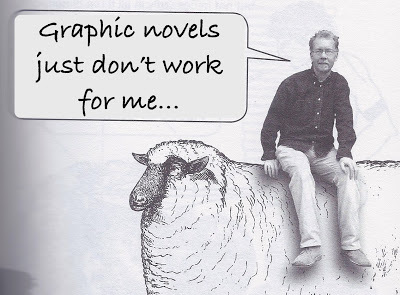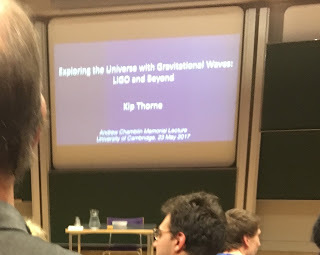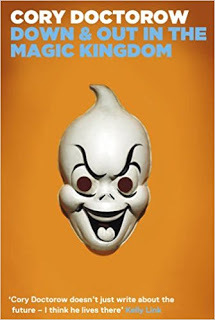Brian Clegg's Blog, page 41
June 2, 2017
Why I don't read graphic novels
 In a recent Facebook discussion of the Amazon Prime TV version of Neil Gaiman's American Gods, someone commented that he thought the book wasn't as good as Gaiman's graphic novels, and I had to reply that I don't really do graphic novels.
In a recent Facebook discussion of the Amazon Prime TV version of Neil Gaiman's American Gods, someone commented that he thought the book wasn't as good as Gaiman's graphic novels, and I had to reply that I don't really do graphic novels.This isn't snobbery, but rather a reaction to three things.
One is I'm not very visual, so I tend to prefer the written word to illustrations. Secondly, many graphic novels (I admit, not all) feature superheroes and I do think that the whole concept of superheroes is juvenile. The only superheroes I've ever really related to were Buffy (et al) and the drunken one that Will Smith plays in a movie whose name I can't remember. And I suspect they mostly appeal because they entirely subvert the genre.
Finally, the problem I have with graphic novels is their pared-down nature. There is no opportunity for long, interesting conversations or intriguing exposition. It all has to fit in a speech bubble or a box. It's like reading in text speak, where I want the full effect.
So if you're a graphic novel fan, please don't think I'm doing you down. I'm delighted that you enjoy them. I pretty well only listen to prog rock and pre/post-classical music, so I'm in no place to criticise other people's tastes. I just wanted to explain why it is that they don't work for me.
Published on June 02, 2017 07:57
May 31, 2017
Wild Pub Walks - Review
 This book seemed to combine two of my favourite activities, which go very well together: good all-day walks and a pint of proper beer. And it does to an extent, as we shall see. Wild Pub Walks combines fairly strenuous hill walks, often around the 10 mile mark with some serious ups and downs, with recommendations of places to sink a pint at the end of the walk. It's divided into England, Scotland and Wales - I'll concentrate on the England section as I'm more familiar with the walks there.
This book seemed to combine two of my favourite activities, which go very well together: good all-day walks and a pint of proper beer. And it does to an extent, as we shall see. Wild Pub Walks combines fairly strenuous hill walks, often around the 10 mile mark with some serious ups and downs, with recommendations of places to sink a pint at the end of the walk. It's divided into England, Scotland and Wales - I'll concentrate on the England section as I'm more familiar with the walks there.When opening a book like this, the natural tendency is to go straight to the overview map and look where the walks are - I must admit to being dismayed at this point as all the English walks in the Lake District, Peak District and Yorkshire Dales. That's the entire country as far as this book is concerned. That was a real disappointment - I'd have much rather they were spread around more effectively. To take the West Country as a example, you can have just as interesting a walk on the coast of Cornwall, on Dartmoor or on the hills and plains of Wiltshire as you can in the Lakes. Even in the North there was, frankly, a touch of the cliché about the choice. I'd have liked to have seen a Pennine walk with somewhere like Blackstone Edge as a start or end point.
So I did begin with a disappointment, which wasn't entirely helped when I looked at the actual walks pages. Visually they were rather messy. Rather than have a clear, large separate map for the walk it was relatively small and artistically integrated into the text, which was scattered with pictures - not idea for a functional guide. You would need a separate OS map as well as the guide, which is not ideal.
Having got over that, I can get on to the good point, the walk instructions, which were clear and interesting, taking in a lot on the way. With the three walks I was familiar with (at least parts of), I recognised some good features to those instructions, particularly when the way gets a bit misleading. And, of course, there's that excellent addition of a small pub guide to your destination, with nice little details - for example, why a particular pub has its sign upside down.
Overall, then, I would recommend this book only if you first check the walk locations and they work for you as it's not anywhere near country-wide. The descriptions are good, and with an OS map alongside you should find your way well. But it could have been better.
Wild Pub Walks is available from amazon.co.uk and amazon.com
Published on May 31, 2017 00:49
Wild Pub Walks - Review - a touch parochial
 This book seemed to combine two of my favourite activities, which go very well together: good all-day walks and a pint of proper beer. And it does to an extent, as we shall see. Wild Pub Walks combines fairly strenuous hill walks, often around the 10 mile mark with some serious ups and downs, with recommendations of places to sink a pint at the end of the walk. It's divided into England, Scotland and Wales - I'll concentrate on the England section as I'm more familiar with the walks there.
This book seemed to combine two of my favourite activities, which go very well together: good all-day walks and a pint of proper beer. And it does to an extent, as we shall see. Wild Pub Walks combines fairly strenuous hill walks, often around the 10 mile mark with some serious ups and downs, with recommendations of places to sink a pint at the end of the walk. It's divided into England, Scotland and Wales - I'll concentrate on the England section as I'm more familiar with the walks there.When opening a book like this, the natural tendency is to go straight to the overview map and look where the walks are - I must admit to being dismayed at this point as all the English walks in the Lake District, Peak District and Yorkshire Dales. That's the entire country as far as this book is concerned. That was a real disappointment - I'd have much rather they were spread around more effectively. To take the West Country as a example, you can have just as interesting a walk on the coast of Cornwall, on Dartmoor or on the hills and plains of Wiltshire as you can in the Lakes. Even in the North there was, frankly, a touch of the cliché about the choice. I'd have liked to have seen a Pennine walk with somewhere like Blackstone Edge as a start or end point.
So I did begin with a disappointment, which wasn't entirely helped when I looked at the actual walks pages. Visually they were rather messy. Rather than have a clear, large separate map for the walk it was relatively small and artistically integrated into the text, which was scattered with pictures - not idea for a functional guide. You would need a separate OS map as well as the guide, which is not ideal.
Having got over that, I can get on to the good point, the walk instructions, which were clear and interesting, taking in a lot on the way. With the three walks I was familiar with (at least parts of), I recognised some good features to those instructions, particularly when the way gets a bit misleading. And, of course, there's that excellent addition of a small pub guide to your destination, with nice little details - for example, why a particular pub has its sign upside down.
Overall, then, I would recommend this book only if you first check the walk locations and they work for you as it's not anywhere near country-wide. The descriptions are good, and with an OS map alongside you should find your way well. But it could have been better.
Wild Pub Walks is available from amazon.co.uk and amazon.com
Published on May 31, 2017 00:49
May 29, 2017
Correlation street
 All too often we see a story in the newspaper where numbers are painfully parroted without giving any consideration to what they actually mean - and all too often that means we need recite our favourite mantra, 'correlation is not causality'.
All too often we see a story in the newspaper where numbers are painfully parroted without giving any consideration to what they actually mean - and all too often that means we need recite our favourite mantra, 'correlation is not causality'.Today's paper carried a wonderful example of this, citing 'research' by Lloyds Bank showing that living in the vicinity of a supermarket will have a varying impact on the price of your house 'depending on the status of the shop.'
As we all know, it shows nothing of the kind. There may be a correlation between being near the shop and house prices - but it's highly unlikely it's causal. The reason we can be reasonably sure of this is that occupant of the number 4 position, Iceland. Anyone who knows their 'status of the shop' rankings knows that Iceland is the pits - certainly below Asda. I don't doubt the pulling power of Waitrose, but the fact is I'd suggest there are other causal factors at play here.
Why would Iceland score higher than the Tesco to Asda set? I'd suggest because these lower rated shops are more likely to be located in the suburbs, where Iceland is more likely to be in a town/city location with higher property prices. Of course I don't know that this is true - it would take a lot more work that I (or Lloyds, I suspect) am prepared to put into it. But I think a third factor, such as location, is far more likely to have produced the Iceland oddity than status. (Location could also impact quite strongly on, for example, M&S.)
News media - I'm not asking you to go into detailed statistical analyses (though that would be nice) - but please think about whether a story is about correlation or causality before you tell us that X causes Y. You wouldn't publish a story with a total guess of who won the FA Cup Final - don't give us guesswork causes hidden behind numbers.
Published on May 29, 2017 07:37
May 28, 2017
Neet Airstream - Review
 For some time I've been using an Apple Airport Express to relay music from my computer to another room to plug into an old fashioned sound system that hasn't heard of Wifi. The setup works well, but it's overkill as the Aiport is a fairly expensive piece of kit that can do far more.
For some time I've been using an Apple Airport Express to relay music from my computer to another room to plug into an old fashioned sound system that hasn't heard of Wifi. The setup works well, but it's overkill as the Aiport is a fairly expensive piece of kit that can do far more.I needed to redeploy the Airport Express for a more heavy duty use, so I looked for a good, low priced alternative to do the job - and settled on the Neet Airstream. It's a little black puck, squarish with rounded corners. It feels fairly lightweight, but seems reasonably well made. The setup process was not brilliantly described in the manual, but is reasonably straightforward, and once it was up and running it simply appeared as an AirPlay device available to computers or phones via the Wifi. The sound seems fine - I'm very happy.
There are a couple of small niggles. The biggest one is that it doesn't come with a power supply. It assumes that there is either a USB outlet on your sound system (there isn't on mine) or that you provide your own power supply. Luckily, most people have the odd spare phone power supply with a USB socket and an old Apple one worked fine.
The second issue was that setup. First you sign a phone or computer into the device's own Wifi, then connect the Airstream into your Wifi network. This can be done either by downloading an app to your phone, or (as I did) by simply typing in the device's address to a browser, after which a click of the appropriate button allows you to log it into your Wifi. It reboots and job done. The only reason it seems more difficult than it is, is because the manual describes this process as 'bridging to the internet', which feels like it's trying to do something completely different. If it had said 'add to your Wifi network' or similar, there would be no confusion.
Overall, though, does the job nicely at a good price.
Neet Airstream is available from amazon.co.uk.
Published on May 28, 2017 06:19
May 26, 2017
The Hydrogen Sonata - review
 I've generally loved the Iain M. Banks 'Culture' novels, but was decidedly disappointed when I happened on
Consider Phlebas,
(admittedly his first) - but thankfully The Hydrogen Sonata was much more the kind of on-form writing I've come to enjoy.
I've generally loved the Iain M. Banks 'Culture' novels, but was decidedly disappointed when I happened on
Consider Phlebas,
(admittedly his first) - but thankfully The Hydrogen Sonata was much more the kind of on-form writing I've come to enjoy.I will get one moan out of the way up front - it's too long. I can't be doing with these doorstop books as a whole, and quite a lot of it felt in need of a good tightening edit. But having said that, there's a whole lot to enjoy here in the complex machinations between different races and seeing different Culture ships exhibit behaviour that isn't necessarily quite what you'd expect.
As usual with Banks there's plenty to ponder in the 'what if' department, here particularly around the concept of 'subliming' where individuals or whole races opt to become part of a disembodied multidimensional spacetime - probably some people's idea of heaven and others of hell. But equally, as Banks did so well, there's plenty of straightforward action, humour and adventure.
This is definitely one of the Culture books I'd recommend to get immersed in the Banks' canon - as all his best books do, it sucks you in early. There are a lot of characters to get your head around, and occasionally I struggled with which ship was which - but generally speaking, as long as you're prepared to go with the flow, it's a great ride.
Down and Out in the Magic Kingdom is available from amazon.co.uk and amazon.com
Published on May 26, 2017 08:49
May 24, 2017
Andrew Chamblin Memorial Lecture
 This is primarily a thank-you to the organisers of the annual Andrew Chamblin Memorial Lecture in Cambridge. I attended yesterday courtesy of the Department of Applied Mathematics and Theoretical Physics, and it was fascinating to hear Kip Thorne, until recently Feynman Professor of Physics at Cal Tech, give an insider view on the development of gravity wave astronomy and the LIGO observatory.
This is primarily a thank-you to the organisers of the annual Andrew Chamblin Memorial Lecture in Cambridge. I attended yesterday courtesy of the Department of Applied Mathematics and Theoretical Physics, and it was fascinating to hear Kip Thorne, until recently Feynman Professor of Physics at Cal Tech, give an insider view on the development of gravity wave astronomy and the LIGO observatory.The lecture was packed - in fact, it appeared to be relayed into other lecture theatres by video link - with an audience that would have given a brilliant score in the I-Spy Book of Physicists (had such a book existed). Thorne began by asking how many in the audience had physics degrees, doctorates and beyond - it was a distinct majority in the main room, but he then made it clear he was addressing his talk primarily to the non-technical remainder, and managed to do so very effectively.
What was particularly interesting from my viewpoint was the speaker's ability to balance the scientific content with the political, organisational and personal aspects of getting a project of this size off the ground. I won't relay lots of detail here, but one very effective story brought out the scale of the problem facing those building the LIGO detector. Thorne pointed out that in a book on gravitation he had said that a LIGO-style detector was 'not promising'. This was because of the scale of the movement of a mirror that has to be detected to 'see' a gravitational wave. Thorne built this up impressively:
If you begin with 1 centimetre and divide by:
100 you get the thickness of a human hair (10-4 m). Divide by 100 again you get the wavelength of the light being used to make these measurements (10-6 m). Divide by10,000 you get the diameter of an atom (10-10 m). Divide by 100,000 you get the diameter of the nucleus of an atom (10-15 m). Divide by 100 again you get the magnitude of the largest motion (10-17 m) we might expect to see in the separation between the mirrors a few kilometres apart.
 It was a surprisingly exhausting day, making a 9 hour round trip for just over an hour's lecture - but well worth it.
It was a surprisingly exhausting day, making a 9 hour round trip for just over an hour's lecture - but well worth it.And that round trip did include a walk back to the station across one of the more remarkable parts of (pretty much) central Cambridge, pictured here - a relaxing end to the day.
Published on May 24, 2017 03:24
May 22, 2017
Renationalise the railways? Really?
 Our railways aren't great. In fact, some of them are terrible. (As it happens, GWR, which is my usual company, isn't bad, but I know that elsewhere things are dire.) So, not unreasonably, many people feel we need to do something different, and the slogan is often 'Bring Back BR.' The only trouble is, British Rail was terrible too.
Our railways aren't great. In fact, some of them are terrible. (As it happens, GWR, which is my usual company, isn't bad, but I know that elsewhere things are dire.) So, not unreasonably, many people feel we need to do something different, and the slogan is often 'Bring Back BR.' The only trouble is, British Rail was terrible too.I had the relatively unusual experience of working for a company that was a nationalised industry when I joined it and which was then privatised after a few years. I have to say, it became a far better company as a result, both as a place to work and in the service it gave to its customers. (These days it's not doing so well, but then it's no longer really a British company.)
The reason, I'd suggest that the BA privatisation worked where BR one didn't is quite simple - we had real competition. Without that, privatisation is a joke. It can bring benefits, but unless tightly regulated it can leave us in the kind of mess the railways now are. Privatisation works when the customer has a choice. But if I want to travel, say, from Swindon to London it's GWR or nothing. It would be complicated to manage, I admit (but then so is airspace), but I honestly think the two keys to improving rail travel are:
a) Competition on major routes. At the very least all the really big routes should have a minimum of two companies operating on them. That means there's choice, and that means companies have to perform to keep your business. Of course there are real difficulties because of the limited amount of permanent way available, but airlines have to manage with very limited airport slots.
b) Some serious subsidy. This seems odd if we're talking about private companies - but environmentally speaking it doesn't make any sense for it to be cheaper to fly to places in Europe than it is to travel by train. Most other European countries manage their subsidies more effectively than we do. Again, it would not be simple, and EU regulations may well prevent it at the moment, but then...
I'm not doing a Donald Trump here. I realise this isn't going to be easy. Getting railways right is phenomenally difficult. But renationalising the railways isn't the answer.
Published on May 22, 2017 09:26
May 18, 2017
Review - Down and Out in the Magic Kingdom
 I'm not quite sure where I picked up a recommendation for this book, but I'm glad I did as I've been able to add Cory Doctorow to my fairly short list of contemporary science fiction writers that I truly enjoy.
I'm not quite sure where I picked up a recommendation for this book, but I'm glad I did as I've been able to add Cory Doctorow to my fairly short list of contemporary science fiction writers that I truly enjoy.In this entertaining short novel, Doctorow takes on the classic SF question of 'What if?' for something that genuinely could come to pass - the no wage economy, where everyone gets the basics they need and it's up to them, through ad-hoc arrangements, to find ways to earn social credit to get more, should they want it. In a way, the social credit (known for unexplained reasons, unless I missed it, as Whuffie) is the equivalent of the rating system in the Black Mirror episode where everyone constantly rates everyone else. The other major change to society, which is far less likely to happen, is that when someone dies they are recreated from a clone which is imprinted with their backed up memory - so death becomes a minor irritation (unless you aren't entirely comfortable with a copy of yourself being a true replacement), while some choose to be put to sleep for thousands of years.
Our hero, Julius, ends up at Disney World, where he works with a group that help maintain and run a group of the attractions, in a period when some of the traditional attractions (the gem of his group's collection is the Haunted Mansion) are being replaced by direct brain access experiences. The main thread of the story follows Julius's attempts at guerrilla action to save his beloved ride in a world where social capital is everything.
On the whole the novel works well - Doctorow manages to be genuinely interesting about the challenges faced by a society where no work is required and lives are indefinite, while never getting into boring polemic. The storyline had some small issues for me, particularly when an outcome is flagged up very early - but I really enjoyed this book, which feels like the kind of thing Pohl and Kornbluth would be writing now if still around - no greater accolade - and I will certainly be trying more of Doctorow's output.
Down and Out in the Magic Kingdom is available from amazon.co.uk and amazon.com
Published on May 18, 2017 02:01
May 17, 2017
Why a coffee cup tax won't have the same effect as the plastic bag tax
 I see in the
i
newspaper that the Lib Dems, with policies I increasingly find sad, are proposing a 5p tax on coffee cups (I assume they mean treated cardboard when they say 'plastic') to try to have the same effect as the plastic bag tax, which has reduced usage of single use carrier bags by about 85%. Unfortunately, I don't think it will work unless it's thought through a bit more.
I see in the
i
newspaper that the Lib Dems, with policies I increasingly find sad, are proposing a 5p tax on coffee cups (I assume they mean treated cardboard when they say 'plastic') to try to have the same effect as the plastic bag tax, which has reduced usage of single use carrier bags by about 85%. Unfortunately, I don't think it will work unless it's thought through a bit more.The point is that the plastic bag tax works because people pay it explicitly and separately. If you use a bag you pay a visible fee. But a coffee cup charge will inevitably be absorbed into the price of a coffee because it's not really a separate item. You can't just have the coffee and not the cup. People won't notice it the same way.
Admittedly, there is a kind of way to have coffee without a cup, and that's to take your own cup in. Starbucks, for example, have a 25p discount on takeaway coffee if you do this. So they are effectively imposing a 25p disposable coffee cup tax - five times as much as that proposed by the Lib Dems. And certainly some people do take their own, but it's an inconvenient thing to do, compared with a carrier bag you can stuff in your pocket. Based on observation on visits to the chain, it's a tiny proportion of people who do - probably significantly less than 8.5% rather than 85%.
For this kind of action to deliver you have to do two things - make the tax visible and easy to avoid by doing the right thing, then to monitor alternatives to ensure you're not just shifting the problem elsewhere. The carrier bag tax has done the first of these, which is great. I haven't seen any reporting on the shifting of the problem, however, which is a little worrying. I know that when Ireland introduced a similar tax there was a surge in production of other types of plastic bag to cover situations where people had been repurposing carrier bags, so the actual reduction in plastic film going into the environment was significantly less than the apparent reduction by merely looking at carrier bag use. I've not seen any figures for this in the UK yet.
Environmental measures should not just be for appearance's sake. They need to deliver a benefit and to have a measurable impact. And I find it hard to believe that the 5p coffee cup tax would be anything more than greenwash.
This has been a green heretic production.
Published on May 17, 2017 01:13



